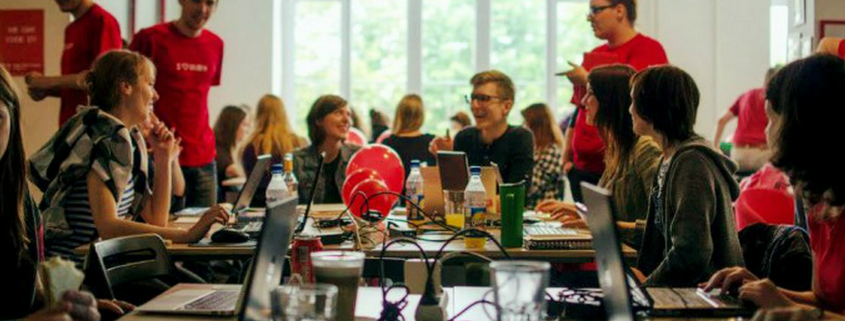Yes, We Still Need Accelerators
a few weeks ago, I was in attendance at Pioneers, in Vienna. It’s a great conference, and there were quite a few really interesting startups on display, including several of our own, like Claimair, TeskaLabs, and Satismeter. What’s more, it’s the right kind of conference for startups. Why is that? Well, as we’ve talked about in the past, there are a multiplying array of “startup industry” events out there, many of which deliver little benefit to actual startups.
Pioneers though, is pitched at investors for its exclusivity. Startups not only have to be selected for the Pioneers top 70, but they also attend for free. Investors, rightly, pay for the event, and for the opportunity to talk with so many promising founders.
There are a lot of VCs at Pioneers, and that’s a good thing. But there were few accelerators, and I think that’s a shame. Here, I’m going to talk about why I think so, and why we still need accelerators.
VCs and Backwards Goals
Part of going to Pioneers, for startups, is identifying fundraising goals. These are included in the company descriptions, and used to match startups with investors at the event. Fine so far.
Most startups, knowing that the event is aimed at tech VCs, say they’re looking for anything from 1 to 5 Million Euros. The average seemed to be about 1.5 Million. While it’s generally true that VCs want to invest in specific ranges, at specific stages, the truth is that most of the startups who are asking for those amounts don’t actually need the money right now. But in order to appeal to as many as they can, startups try to optimize their “ask,” before talking with the investors.
Instead of assessing their near-term business goals and funding needs, and narrowing their focus on a specific type of investor, they’ll craft a pitch for investors that portrays them as emerging companies that are “months away,” from a breakthrough advance that will turn the industry on its head.
The customers are just waiting to buy. The specific market need is a foregone conclusion. So really, in their imagining, it’s just a matter of the VC believing in the long-term prospects of the company and its industry, and assuming that the money is going to help them ride out their short-term challenges.
It’s a case of “get the money now, and figure out how to grow after that.”
It Doesn’t Work That Way

In order to paint rosy pictures about the future, founders tend to make startlingly bold predictions about their ability to do things that literally no one else has ever done in business. A new technology is new; and proving the market need for it is really at the heart of what an early stage startup should focus on. When I hear from a startup that their new technology is going to “change the way that X does Y” (eg: doctors diagnose cancer, or manufacturers bill distributors, or parents teach children), the first question I ask is “does X really want to change the way they do Y?”
Maybe they do. But then again, maybe they don’t. Maybe they do, but they want to do it in a completely different way. Maybe, maybe, maybe. Startups assume that investment is going to paper over those questions.
Ironically, VCs seem to operate according to the exact opposite assumption: a company that needs their money is not a company they want to invest in. Ideally, they would only invest in companies that have already proven they can make partnerships and sell, and the capital they receive will go mainly to doing more of what they already do well.
In effect, venture capital is an accelerant, not a fuel source. Startups treat it as a first step, when really it’s somewhere near the end of the process.
Why It Happens
Why then the disconnect? I think there are two problems:
1- Founders have been convinced that the “funding gap,” between early stage investors, -like business angels- and VCs is an artifact of the business; a bug rather than a feature. They become persuaded that they need to conform to what VCs expect, because VCs are too rigid, and need to have items checked off their list in order to invest. If they just tick the boxes, they’ll get the investment.
It doesn’t help that in some overheated markets, that’s really true. Some startups do seem to raise investment by ticking the appropriate boxes at just the right time.
But in reality, the funding gap is there mostly because it’s a bad idea for most investors to get involved with a company that doesn’t have product market fit, but wants to commit significant time and resources to developing new technology.
Simply, too much money at the wrong stage can be a bad thing. It can encourage a startup to build up technical debt without solving key issues of market fit. The funding gap can keep that from happening, by making it harder for startups to raise money at the wrong time, or for unsound reasons.2- VCs are not always motivated to tell founders about these concerns. They stay positive and encouraging, in case the startup suddenly proves it can really grow.
I can’t say how many times I’ve talked to a really impressive startup team, with really impressive technology, who are having problems raising money, and don’t know why they can’t. Investors seem impressed with them and their tech, and yet they don’t pull the trigger on investment.
“Everybody really likes it, and we’ve had really positive feedback. Some VCs are very interested in what we’re doing.” Of course they are, because why wouldn’t they be? But eyeing someone in a bar, and marrying them are two different things: startups can easily fall into the belief that “interest” equals “appetite.”
The Rule Book is No Good
Knowledge about the “startup industry,” and about investors has grown among startup founders. They’re now able to suss out and learn about the way VCs work, and the way they make decisions.
I was recently handed, at another conference I will not name directly, a literal book called the Startup Playbook. This kind of thinking predominates among people who neither invest in startups, nor run their own.
My belief is that this leads some founders to the mistaken conclusion that because they understand how VCs work, they can therefore get investment from VCs. However, the fact that a startup understands a cap table and has a clear idea of the kinds of things a VC invests in does not mean that they can get that VC to invest in them.
And this is where accelerators still play a vital role. There are plenty of stars in the tech industry who are simply unaware that they are stars. Because they play by the “rule book,” that everyone is increasingly aware of, they may forget that the rules don’t have to apply to them. And accelerators are, at the core, about breaking the rules.
We Still Need Accelerators
If you compare accelerators with other investors, we should look like odd ducks. We shouldn’t behave according to typical patterns. Because our appetite for risk should be unusually high, our tolerance for uncertainty should also be commensurately wide. Open questions, to us, should be good things, and sure things, less interesting.
That approach can really help startups to focus on doing what they do best, which is solving problems no one else knows how to solve. Where a lack of certainty may be a negative to a VC, it is ideal for us as a starting point. Uncertainty is something you can work with, and something you need in order to be truly unique. You have to question everything, and be questioned on everything.
Founders usually seem to expect an accelerator to behave the way a VC would: to be encouraging but vague. But more often than not, startups in the situation I’ve described end up expressing a sense of relief after a meeting: “I’m so glad we talked about this. I never get feedback that’s so direct.”
This is part of why VCs look more and more to accelerators to be the first movers in new market categories, new technologies, and new business concepts. More and more, our own contacts in the VC world turn to us not only for opportunities to invest in startups, but also to steer startups in our direction, hoping that the accelerator will be a proving ground for the team, the business, and the technology itself.
Attending an accelerator is not for every startup, but it is increasingly becoming a badge of confidence that VCs are looking for. And every year, we see VCs paying closer attention to our program, and others like it, to gain insights and opportunities they can’t get anywhere else.




